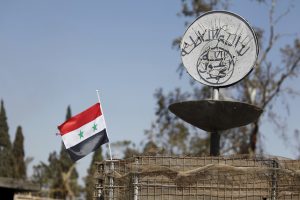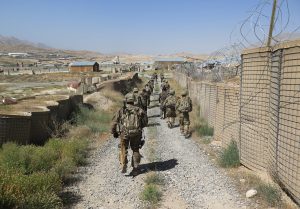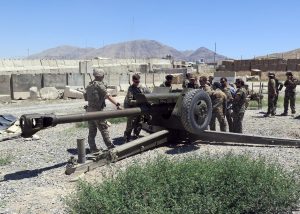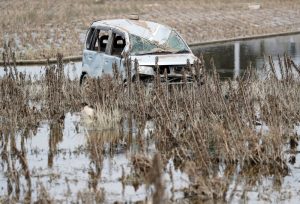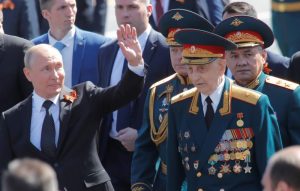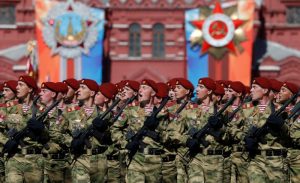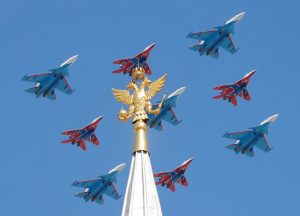
By Alexandra Ulmer and Marianna Parraga
CARACAS (Reuters) – Last July 6, Major General Manuel Quevedo joined his wife, a Catholic priest and a gathering of oil workers in prayer in a conference room at the headquarters of Petroleos de Venezuela SA, or PDVSA.
The career military officer, who for the past year has been boss at the troubled state-owned oil company, was at no ordinary mass. The gathering, rather, was a ceremony at which he and other senior oil ministry officials asked God to boost oil output.
“This place of peace and spirituality,” read a release by the Oil Ministry that was later scrubbed from its web site, “was the site of prayer by workers for the recovery of production of the industry.”
President Nicolas Maduro turned heads in November 2017 when he named a National Guard general with no oil experience to lead PDVSA [PDVSA.UL]. Quevedo’s actions since have raised even more doubts that he and the other military brass now running the company have a viable plan to rescue it from crushing debt, an exodus of workers and withering production now at its lowest in almost seven decades.
Aside from beseeching heaven, Quevedo in recent months has enacted a series of controversial measures that oil industry experts, PDVSA employees and contractors, and even everyday citizens say are pushing the once-profitable and respected company towards ruin.
Soldiers with AK-47s, under orders to prevent cheating on manifests, now board tankers to accompany cargo inspectors, rattling foreign captains and crews.
Workers who make mistakes operating increasingly dilapidated PDVSA equipment now face the risk of arrest and charges of sabotage or corruption. Military chieftains, moonlighting in the private sector, are elbowing past other contractors for lucrative service and supply business with PDVSA.
In a little-noted reversal of the Socialist government’s two-decade drive to nationalize the industry, the lack of expertise among military managers is leading PDVSA to hire outsiders to keep afloat even basic operations, like drilling and pumping oil. To the dismay of many familiar with Venezuela’s oil industry, some of the contracts are going to small, little-known firms with no experience in the sector.
Combined, industry veterans say, the steps leave Venezuela’s most important company – which accounts for over 90 percent of export revenue – with even fewer means to rebuild the nation’s coffers, pay its many creditors and regain self-sufficiency as an oil producer.
“What we are witnessing is a policy of destroying the oil industry,” said Jose Bodas, general secretary of the Oil Workers Federation, a national labor union. “The military officials don’t listen to workers. They want to give orders, but they don’t understand this complicated work.”
Maduro defends the military managers, arguing they are more in synch with his Socialist worldview than capitalist industry professionals who exploit the country for personal profit. “I want a Socialist PDVSA,” the president told allied legislators earlier this year. “An ethical, sovereign and productive PDVSA. We must break this model of the rentier oil company.”
Quevedo, who holds the title of oil minister as well as president of PDVSA, didn’t respond to requests for comment for this story. Neither Venezuela’s Information Ministry, responsible for communications for the government and senior officials nor PDVSA’s press office returned phone calls or emails from Reuters.
PDVSA and the Oil Ministry disclose scant information about Quevedo, who is 51, according to his social security registration. He seldom makes public speeches. But at an industry event in Vienna last June, Quevedo told journalists PDVSA is aware of its challenges and hoped within months to make up for plummeting output.
“We hope by year end to recover the lost production,” he said in a forecast that has been missed. “We have the capacity and we have summoned the strength of the workers.”
Nearly 20 years after the late Hugo Chavez launched his “Bolivarian revolution,” much of Venezuela is in tatters. Food and medicines are scarce, hyperinflation has gutted purchasing power for increasingly desperate citizens and roughly three million Venezuelans have fled the country in search of a better life.
At PDVSA, managers long sought to keep the company running, even if the economic meltdown and falling oil prices meant they had fewer resources to invest in exploration, growth and basic maintenance. Despite their efforts, decay led to dwindling production, deteriorating facilities and a progressive loss of skilled workers.
Now, critics say, military officials atop PDVSA have put aside any pretense of running it like a proper business, doing little to stem the fall in production or improve the company’s financial, operational and staffing problems.
A PURGE
No matter the dysfunction, PDVSA remains a rare and crucial source of foreign currency in the enfeebled Andean country. For Maduro, who became president after Chavez died in 2013, handing the company over to the military is seen by many as a calculated move to buy loyalty from officers.
“No one will be able to remove the military from PDVSA now,” said Rafael Ramirez, a former oil minister. Ramirez ran the company for a decade under Chavez before clashing with Maduro, who accuses him and many other former executives of corruption. “PDVSA is a barrack.”
PDVSA is struggling to fulfill supply contracts with buyers, including major creditors from China and Russia who have already advanced billions of dollars in payments in exchange for oil. Last month, the head of Rosneft, the Russian oil company, flew to Venezuela and complained to Maduro about the delays, Reuters reported.
Demand remains healthy for Venezuelan oil. Operational problems under Quevedo, however, have caused production to drop 20 percent to 1.46 million barrels per day, according to the latest figures Caracas reported to OPEC, the oil cartel, of which it is a member.
Quevedo in January will assume OPEC’s rotating presidency for one year. PDVSA’s financial problems are likely to demand much of his attention.
The gross value of PDVSA’s oil exports is expected to fall to $20.9 billion this year compared with $24.9 billion last year, according to a calculation provided to Reuters by the International Energy Center at IESA, a Venezuelan business school. Exports a decade ago were over four times as much, reaching $89 billion, according to PDVSA’s accounts for 2008.
PDVSA didn’t publish a 2017 report and hasn’t released financial results in 2018.
Little has been publicly disclosed by PDVSA or Maduro’s government about the military transformation within its ranks.
A Reuters examination based on confidential PDVSA documents – as well as interviews with dozens of current and former employees, shippers, traders, foreign oil executives and others who do business with the company – shows how Quevedo’s National Guard is seeping into every facet of its operations. The documents include employment records, agreements with contractors and internal staff memos.
Quevedo has appointed more than 100 aides and advisors from the military and from a previous post as a government minister to senior positions, according to a person familiar with PDVSA’s human resource records.
At its shabby concrete Caracas headquarters, once brimming with suited executives, military officers are now in charge of operations. Workers say offices in Quevedo’s penthouse sanctum remain luxurious. But in the run-down halls below, socialist propaganda, including portraits of Fidel Castro and Ernesto “Che” Guevara, is among the scant decor left on the walls.
The shift toward military management was the result of a purge of PDVSA leadership.
Allegations of corruption have been rife across the Venezuelan government in recent years; Maduro himself is the target of U.S. sanctions for graft and human rights violations, which he denies.
In 2017, the president leveled his own accusations against PDVSA, describing it as a den of “thieves.” He accused many former executives of skimming from contracts and laundering money and argued that their graft worsened the country’s crisis.
He ordered the arrest of dozens of top managers, including PDVSA’s two previous presidents, chemist Nelson Martinez and engineer Eulogio Del Pino. Martinez died at a military hospital earlier this month, suffering a heart attack while undergoing kidney dialysis, two people familiar with the circumstances said.
Del Pino remains detained, awaiting trial. Reuters was unable to reach his lawyers for comment. A person familiar with Del Pino’s defense said he has yet, after a year in jail, to have an initial court hearing.
LOYALIST
At the time of the purge, Quevedo had risen from the National Guard ranks to become a prominent government loyalist.
Quevedo’s Twitter profile often features a photo of the general, a stocky and balding man with heavy eyebrows, reviewing paperwork with the president or smiling happily alongside him. His feed consists almost exclusively of retweets of Maduro’s posts.
Since 2001, the general has moved between military and civilian positions. He has a longstanding relationship with Diosdado Cabello, the powerful vice president of the Socialist party: The two were classmates as young men at military school.
Those ties led to senior posts for Quevedo at the Defense Ministry and a program created by Chavez for low-income housing, according to official government gazettes and people who know his trajectory.
In 2014, back in a command role with the National Guard, Quevedo led a unit that clashed with demonstrators during protests that shook Venezuela for four months. At least 43 people, on both sides, died during the demonstrations, sparked by the onset of food shortages.
Quevedo was criticized by many government opponents for using excessive force, which he denied. He appeared frequently on state television at the time, donning an olive-green helmet and bullet-proof vest. “These are terrorist groups,” he said of the protestors, who eventually dissipated, leading him to declare that “the coup has been defeated.”
Pleased with Quevedo’s performance, Maduro in 2015 named him housing minister. In his two years in the post, he again became a fixture on state television, often wearing the red shirt of the Socialist movement and praising Maduro’s “humane” housing policies.
Opposition leaders scoffed at what they saw as Quevedo’s outsized boasts, including an unsubstantiated claim that the government constructed more than 2 million homes, despite widespread shortages of basic building materials. The housing ministry didn’t respond to requests for comment.
In November 2017, intelligence agents arrested former PDVSA chief Del Pino in a predawn raid on unspecified graft charges. By then, Quevedo was Maduro’s choice to lead the all-important company. The announcement prompted widespread skepticism in the industry.
Quevedo said he would need little time to get a handle on the oil businesses. “Give me 10 days,” he told acquaintances, according to one person who spoke with him at the time.
From the start, Maduro made clear the challenge ahead. In a public address during “Powerhouse Venezuela 2018,” a government conference meant to showcase business potential, the president ordered Quevedo to boost oil output by a whopping 1 million barrels per day – roughly a 50 percent increase at the time.
Over the past year, though, Quevedo has failed to reverse the slide.
One of his first challenges, according to people within PDVSA, was to stanch the flow of workers, many of whom deserted the company and Venezuela altogether. PDVSA hasn’t disclosed recent employment figures. But estimates by IPD Latin America, an oil and gas consultancy, indicate PDVSA has about 106,000 workers, 27 percent fewer than in 2016.
Because of cost-of-living increases that now top 1 million percent per year, according to Venezuela’s National Assembly, PDVSA salaries have crumbled to the equivalent of a handful of dollars a month for most workers.
With no money and little real work to do at idle and faulty facilities, some employees only show up to eat at the few company cafeterias that remain open. Shippers told Reuters that PDVSA workers at times board vessels to ask for food.
“MALICE”
To boost manpower, Quevedo has been staffing some jobs, including posts that once required technical knowledge, with National Guard recruits. The terminal of Jose, a Caribbean port in northeast Venezuela, is one of the few remaining facilities from which PDVSA exports crude oil.
The changes are disturbing buyers here. Some tanker captains complain that young soldiers are woefully unprepared to verify technical details, like whether crude density, a crucial attribute of quality, comply with contract specifications, according to three shippers and one PDVSA employee.
Crews fret a stray bullet from the soldiers’ rifles could spark fires and complain that some of the crime afflicting the country is making its way on board. Although Quevedo has tasked the soldiers to help spot graft, some of the low-paid recruits ask for bribes themselves, shippers said, for signing off on paperwork or completing inspections.
“There are many risks,” one captain told Reuters.
Venezuela’s Defense Ministry, which oversees the National Guard, didn’t respond to Reuters phone calls or emails requesting comment.
Even with soldiers as substitutes, PDVSA can’t find the workers it needs to man many posts. From the processing of crude at refineries to contract negotiations with buyers, the shortage of skilled staffers is hobbling the company.
In a recent internal report, PDV Marina, the company’s maritime unit, said staffing was in a “critical state” on PDVSA’s own tankers, forcing some workers to toil far more than allowed by union rules. The “alarming deficit of main staff,” the report read, means “we cannot honor labor agreements.”
Tensions with military managers are causing even more departures, some workers say.
Consider an incident in June, when two tankers docked at Jose. One prepared to take on heavy crude, the other a lighter grade of oil.
As the tankers loaded, PDVSA port employees noticed a mixup – the two crudes had blended. The mistake, the government said later, forced PDVSA to pay the buyers, because of contractual penalties, $2.7 million.
It would also be costly for nine PDVSA employees.
Shortly after the error, soldiers and intelligence agents arrested the workers, and prosecutors charged them with sabotage. “This was premeditated,” said Tarek Saab, Maduro’s chief prosecutor, announcing the arrests on television. “The actions go beyond negligence – there was malice here.”
After three days in an overcrowded military jail, they were released, pending trial. Two workers in the oil industry familiar with their case said poor maintenance, not sabotage, caused the mishap. A faulty valve system, flimsy after years without upkeep, caused the fuels to mix, they said.
Six months later, the government has presented no evidence against the workers.
Reuters was unable to reach the accused or to independently determine the cause of the mishap. Colleagues said the workers are under orders not to speak publicly of the incident.
The arrests have rattled PDVSA employees, especially because soldiers and intelligence agents have also detained workers at other facilities after mistakes.
In July, four PDVSA employees were arrested after crude spilled into a river near an oilfield in the state of Monagas, according to workers and media accounts there. One worker in Monagas told Reuters that faulty turbines caused the spill and that a vehicle shortage kept employees from reaching the site to stem the flow.
“We don’t understand how a lack of resources becomes an excuse to accuse workers of negligence or sabotage,” he said. “They’re being asked to work without safety equipment, tools, even without being able to feed themselves or their families.”
Quevedo has been creating new partnerships that are meant to shore up PDVSA. In August, for instance, the general said the company was “opening its doors” for seven private companies to pursue unspecified “service contracts” across the country.
The move raised eyebrows here, because it ran counter to longstanding efforts to nationalize the entire industry. Chavez himself phased out similar contracts, arguing that they enriched private enterprise for work that the state should do itself.
According to a document seen by Reuters, the companies obtained six-year agreements to operate oilfields on behalf of PDVSA in return for boosting output, financing investments and procuring equipment.
But the companies are unfamiliar even to veterans of Venezuela’s oil industry. None are recognized as having experience operating oilfields. Consorcio Rinoca Centauro Karina, one of those listed on the document, doesn’t appear to have a web site. Reuters was unable to reach it or any of the others.
Critics of the arrangements, and government opponents, say the transactions aren’t transparent. By keeping details from the public, they argue, the company faces little scrutiny over whom it chooses to do business with.
“PDVSA is looking to maintain its confederation of mafias, its quota of looting,” said Jorge Millan, an opposition legislator who in September led a push in the National Assembly to denounce the contracts.
While Quevedo’s militarization of PDVSA hasn’t reversed the company’s decline, the government shows few public signs of displeasure. In October, the government announced a PDVSA board shuffle. Among the changes: Jose Rojas, another National Guard general, replaced a civilian director.
Past executives joke that Quevedo knew what he was doing when he prayed for help.
“He’s right,” said Jose Toro Hardy, an economist who served on PDVSA’s board of directors in the 1990s. “A miracle is needed for an increase in these conditions.”
(Additional reporting by Mayela Armas and Vivian Sequera in Caracas and Ernest Scheyder in Vienna. Editing by Paulo Prada.)



